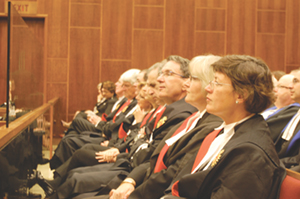Ontario Chief Justice Warren Winkler wants to see a complete overhaul of the province’s family law system rather than more tinkering around the edges of a flawed process.

“The time has come for a fresh conceptual approach to resolution of family disputes in Ontario,” Winkler said last week while speaking at the annual Opening of the Courts ceremony.
He told the audience, a who’s who of the Ontario legal scene that included judges of all three courts in Ontario and attorneys general of both the federal and provincial governments, that the old system needs a complete rethink.
“I question the effectiveness of the slow and steady approach of fine-tuning and rationalizing the present system,” he said.
“Rather than incremental change, perhaps it is time to consider a more dramatic and pragmatic revision of the manner in which family law services are delivered across Ontario.”
At the heart of the family law system envisioned by Winkler would be an alternative dispute resolution scheme that would double as a gatekeeper to the courts.
“Only in the event that the alternative dispute resolution process is unsuccessful would access to the costly, time-consuming, adversarial, and sometimes acrimonious court process be made available to litigants,” he said.
By making the mediation process mandatory, Winkler said more cases would reach resolution early. In addition, he said litigants would benefit from a more informal and cheaper procedure.
Heather Smith, chief justice of the Ontario Superior Court of Justice, was much more positive about changes to the family system in her court. She touted joint initiatives with the Ministry of the Attorney General designed to make the whole process less complicated.
Smith praised pilot projects in Milton and Brampton, Ont., stemming from the attorney general’s so-called four pillars of family law: information programs, triage, alternatives to court, and streamlined court processes.
At the pilot project sites, courts have implemented mandatory information programs for litigants and use dispute resolution officers to point them in the direction of the most suitable route depending on the nature of their conflict.
“Over the past year, the court has taken huge strides towards improving the upfront services for family proceedings,” Smith said.
But she noted some of the most useful resources, such as Family Law Information Centres, on-site mediation services, legal advice, and duty counsel are only available at the Superior Court’s 17 family branch sites. In her view, family law litigants require the additional help at every one of the court’s 50 locations.
“Our court’s aim is to ensure that these necessary front-end services are available to all litigants,” she said.
At the Ontario Court of Justice, Chief Justice Annemarie Bonkalo was also encouraged by progress on the four pillars during the last year and noted 25,000 families in crisis had come through the doors of her court over that period.
“We have seen judges, Legal Aid Ontario, ministry staff, lawyers, social workers, and other family law professionals come together to try to ensure that Ontario families in distress experience our courts in the least harmful way possible,” she said.
“I am proud of the work that has been accomplished.”
Her court is now working on an integrated domestic violence court pilot project that would improve communication between the family and criminal courts for cases involving the same people.
Winkler also used the opportunity to echo a request he made last year for a new courthouse in Toronto to ease the burden on facilities in the criminal court, a situation he called “critical.”
“It is indisputable that if we want cases to be dealt with in a timely manner, we must improve our courthouse facilities,” he said. “Unless our courthouses match the increased demands placed upon them, we risk intractable delays and potential miscarriages of justice.”
Smith said the provincial government has taken important steps this year towards delivering long-sought improvements in court technology by promising a “comprehensive technology-based system for the court’s work” within years. Nevertheless, she also had issues with the courts’ physical infrastructure.
“We do face remaining challenges, in particular the impediments to securing vitally necessary facilities for our court’s judges in a number of locations,” she said. “Brampton, where our judges face an increasingly heavy criminal workload, presents an acute challenge.”
In a brief riposte, Attorney General Chris Bentley pointed to renovations and improvements at court locations around the province, including a brand new facility in Thunder Bay, but acknowledged “there is more work to be done.”
When issues of court administration arise, Winkler said the judiciary has an important role to play alongside that of the government.
He noted both share an interest in fair, accessible, and timely judicial services and said the Court of Appeal will soon sign its first memorandum of understanding with the government setting out the respective responsibilities of each in running the court.
“I am not here today to advocate for a whole scale takeover of the administration of justice by the judiciary. Rather, I am here to promote continuing on the course towards increased judicial participation in operational and policy planning for the court system.”
Earlier in the day, the three chief justices presented the Ontario Justice Education Network Award for Outstanding Contribution to Justice to Grace Russell during a ceremony at Osgoode Hall.
Russell co-ordinates OJEN’s Courtrooms and Classrooms program for the Ontario Court of Justice in Toronto, which brings 13,000 students to Old City Hall each year to give them a look at justice in action and the chance to meet with Crown counsel, defence lawyers, and judges.
For commentary on this issue, see "
Winkler sparks important debate on mediation."

 “The time has come for a fresh conceptual approach to resolution of family disputes in Ontario,” Winkler said last week while speaking at the annual Opening of the Courts ceremony.
“The time has come for a fresh conceptual approach to resolution of family disputes in Ontario,” Winkler said last week while speaking at the annual Opening of the Courts ceremony.